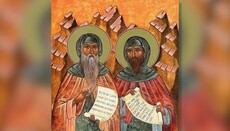Model of interpersonal relationships

Sunday sermon.
"I urge you to live a life worthy of the calling you have received. Be completely humble and gentle; be patient, bearing with one another in love, making every effort to maintain the unity of the Spirit in the bond of peace" (Ephesians 4:1-2).
One phrase from the apostolic reading, and within it lies the essence of the model of interpersonal relationships between people – humility, gentleness, patience, love, and forbearance. It seems simple, but how hard it is to put this into practice! Our entire life is full of conflicts and contradictions: with relatives, colleagues, close and distant ones. We are all terribly incompatible. Nothing is right, everything is wrong. This chronic dissatisfaction devalues life itself. So much that sometimes we don't even feel like living anymore. The Apostle Paul gives us a simple and clear recipe for how to regain the joy of life and become happy.
All that is needed is to remove the contradictions that disturb our peace. To do this, we need to understand one simple thing. All our problems are in only one place – in our head.
Once we fix our roof, we will see that the roofs of the neighbouring houses, in some miraculous way, also stop leaking.
This repair is not easy. It begins with the need to lock away our “opinion” and our “position” at all times. They will bang, shout about the infringement of rights, throw tantrums, etc. But, in time, they will quieten down in submission. Any small or big quarrel is like a nuclear war in which there are no winners. It doesn't matter who is right or wrong. What matters is that the peace of the soul, the inner calm, is lost, and there is a fire in the heart. So, what does it matter what caused the fire or who threw the cigarette butt first? The house has already burnt down.
We often think of ourselves as truth-lovers and fighters for justice, but we forget that all wars and revolutions, which led to millions of deaths, began precisely with the struggle for truth and justice. We also forget that the most untruthful and unjust being in the world is God. What truth is there in the Crucifixion of Christ? That is the highest injustice imaginable. What truth is there in the fact that Christ dies for ungrateful sinners? And what justice is there in loving one's enemies? Why does the Saviour pray to the Father to forgive those who crucify Him?
God does not aim to restore justice and lawful order. He simply wants to make us happy. Not only in the future, but here and now. Therefore, the commandments about forgiving those who wrong us, loving our enemies, and being able to humble ourselves and love – these are the recipes for how to become happy. There is no justice here, but there is an obvious fact.
A person who has acquired love for God and all people without distinction is a happy person. He/she has no internal contradictions or conflicts with anyone. But to reach this state is not easy. One must overcome the “I,” and this is a heavy cross. A lot of sweat and blood must be shed to kill one's self-love, self-pity, and sense of superiority. For a Christian, the fact of restoring justice or truth is not important, but the final result is. The result can only be one – peace of soul.
The serpent's road that leads the soul to hell is called “reasoning”. It inevitably leads to condemnation, and then to grumbling, anger and discontent.
In reasoning, we engage the entire mechanism of our self – logic, thinking, comparison and judgment – but we forget that all of this has long been rotten and tainted by sin. All our mental activity is sinful both in essence and in content. Our evaluative judgment is always biased. We initially construct it from the point of our egoism and egocentrism. It is false from the root. That is why obedience in the ancient monastic tradition was aimed at destroying this hellish fortress. The monk was required to fulfil obedience without reasoning. If the elder said, "Go with a bucket of water for three kilometres to water a dry stick sticking out of the sand," the monk would go and water it. If the elder said, "Plant the saplings of trees with their roots upwards," the monk would plant them, without hesitation or analysis.
Thus, a person's will becomes soft. The skill of humility is acquired. The tension that hardens the soul disappears. All that is hard quickly breaks, but softness, flexibility and pliability allow one to maintain inner peace in any circumstance of life. Of course, to acquire such inner pliability requires a lot of patience. Wise elders’ disciples know only two words – “forgive” and “bless”, and they do not need to know any other words.
If we learn, even to some extent, to perceive people, the world and life's circumstances in such a way that we do not reason over them, do not reflect on them but simply accept them calmly and with love as a given, we will avoid many soul-wounding circumstances.
It is important to learn to love and forgive, not as if doing someone a favour and thinking, “I am still right,” but simply according to the law of spiritual life. A Christian should not argue or conflict, for arguments make us mad. Truth does not need the rotten supports of our passionate emotions. It exists as an unshakable fact and state, regardless of who and how they relate to it. The essence of the spiritual life is not to defend Truth, but to become an inseparable part of it.











